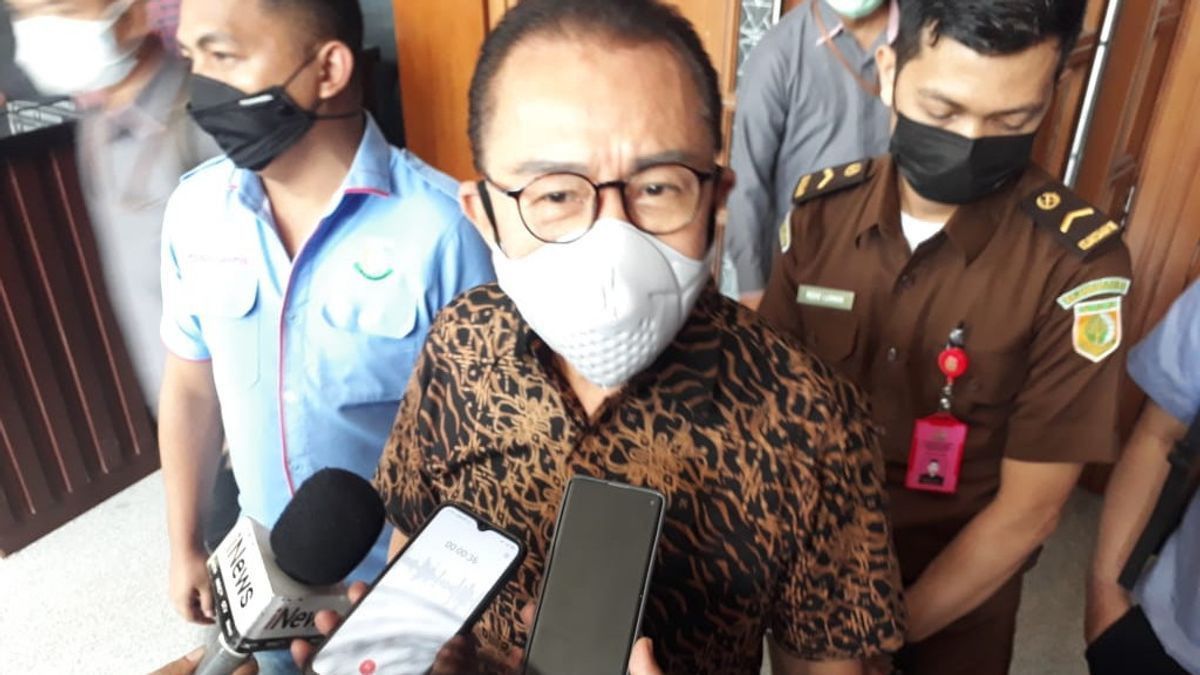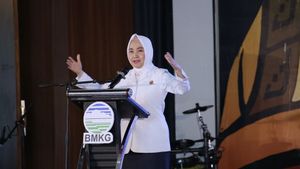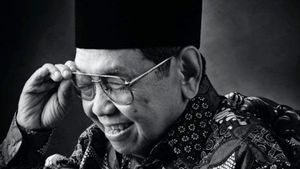JAKARTA - Joko Soegiarto Tjandra alias Joko Tjandra believes the panel of judges will provide a light sentence in cases of alleged gratification of the Supreme Court (MA) fatwa management and the removal of red notices. However, this belief faded after the panel of judges sentenced Joko Tjandra to a heavier than the charges.
Initially, Joko Tjandra was sure that the panel of judges would impose light sanctions because the prosecutor's (JPU) demands were considered inconsequential.
"Sure, it is lighter, there are many people who are nonsense," said Joko Tjandra before the trial at the Corruption Court, Jakarta, Monday, April 5.
The inconsequential context that Joko Tjandra meant was that the prosecutor's demands were not proven. This is because during the trial process including the witness examination it was not proven that he was a bribe.
Therefore, Joko Tjandra hopes that the panel of judges can read the facts that have been revealed in the trial. He hopes that the witness will make a lightening of the decision by the panel of judges.
"The best is in accordance with the facts," he said.
However, the facts are different. In the two cases, Joko Tjandra was convicted and sentenced to imprisonment of four years and six months. Also, a fine of Rp. 100 million, a subsidiary of 6 months in prison.
This verdict is heavier than the prosecutor demands. This is because the prosecutor previously charged Joko Tjandra with four years in prison.
"Therefore, imposing a sentence on the defendant is punishable by imprisonment of 4 years and 6 months," said chief judge Muhammad Damis.
The decision of the panel of judges is based on the consideration of the testimony of the witnesses and experts who have been presented. Also, several pieces of evidence were attached and tested in the trial
In addition, there are two other considerations for the panel of judges in making decisions, namely, things that are burdensome and mitigate.
For burdensome considerations, the panel of judges said that one of them was because the crime committed by Joko Tjandra involved law enforcement officials.
"The defendant's actions did not support the government in preventing and eradicating corruption, collusion and nepotism. The actions were carried out as an effort to avoid court decisions that have permanent legal force. Bribery is made to law enforcers," said Damis.
Meanwhile, for mitigating matters, it was only because Joko Tjandra was always cooperative in the trial. Thus, the attitude addressed by Joko Tjandra was taken into consideration.
"The defendant was polite during the trial and the defendant was an elderly man," he said.
With this verdict, Joko Tjandra has been deemed to have been legally proven to have violated Article 5 paragraph 1 letter a and Article 15 in conjunction with Article 13 of Law Number 31 of 1999 as amended by Law Number 20 of 2001 concerning Eradication of Corruption in conjunction with Article 55 paragraph 1 to 1 KUHP in conjunction with Article 65, paragraphs 1 and 2 of the Criminal Code.
"Stating that the defendant Joko Soegiarto Tjandra was legally and convincingly proven guilty of joint corruption," said the judge.
In fact, the panel of judges also rejected the application of justice collaborator (jc) submitted by Joko Tjandra. This is because the judge assessed that Tjoko Tjandra was the main actor.
"Considering seeing the defendant's petition to be determined as jc and the response from the prosecutor who thinks the defendant cannot be a justice collaborator," said member judge Saifudin.
The judge assessed that Joko Tjandra as the main actor because in the case of MA fatwa administration, he had received an action plan. Although, he always stated that in that case he was a victim.
"Whereas in the trial of this case the defendant had received an action plan from witness Andy Irfan Jaya according to an agreement that would be given to the defendant after the defendant handed over money to witness Pinangki Sirna Malasari through Andy," said Saifudin.
"After handing over the money, the defendant conveyed information to Anita's brother that some of the money had been handed over to Pinangki," continued Saifudin.
Meanwhile, in the case of removing red notice, based on witness examination, Joko Tjandra was proven to have asked Tommy Sumardi for help. So, Tommy helped him by communicating with Brigadier General Prasetijo Utomo and Inspector General Napoleon Bonaparte.
"Thus the defendant knows to whom the money was given to process the interpol red notice and the deletion of the defendant's DPO. Moreover, Tommy always reports progress to the defendant, including the defendant's DPO status which has been disclosed by the Director General of Immigration," he said.
Sentences Considered LowEven though the panel of judges sentenced Joko Tjandra to six months heavier than the charges, the Indonesia Corruption Watch (ICW) assessed that the sentence that was knocked out at the Tipikor Court was still a problem.
The reason is that the article concerning the giver of bribes can only be punished with a maximum sentence of five years in prison.
"In fact, the model of crime committed by Joko S Tjandra deserves a life sentence," said ICW researcher Kurnia Ramadhana.
Moreover, Joko Tjandra once fled from the legal process and was later proven legally and convincingly proven to bribe law enforcers ranging from Attorney Pinangki Sirna Malasari, Brigadier General Prasetijo Utomo, to Inspector General Napoleon Bonaparte.
Not only that, Joko Tjandra's action to easily enter Indonesian territory to process a judicial review (PK) registration has brought down the face of Indonesian law enforcement. So, reflecting on this, continued Kurnia, ICW suggested that the legislators immediately revise the Corruption Act.
For example, including imprisonment for a maximum of life. So that in the future, if there are parties who commit the same actions as Joko S Tjandra, they can be imprisoned with the maximum sentence.
"At least to accommodate the article giving bribes to law enforcers so that it is specifically regulated," he said.
ICW also reminded the Corruption Eradication Commission (KPK) not to just be quiet and watch the handling of this case. Because, ICW is also suspicious of the supervision warrant issued by the KPK, it seems that it is just a formality.
"Because, until now there is practically no concrete thing that has been done by the KPK in the case of Joko S Tjandra," said Kurnia.
Not only that, this anti-corruption activist also demands that the KPK further investigate and investigate other parties who have not been investigated by the AGO or the Police. For example, investigating who was behind Pinangki Sirna Malasari so that they could meet and offer assistance to Joko Tjandra.
"This is important, because until now ICW still believes that there are other people who have not been touched by the Attorney General and the Police," he concluded.
The English, Chinese, Japanese, Arabic, and French versions are automatically generated by the AI. So there may still be inaccuracies in translating, please always see Indonesian as our main language. (system supported by DigitalSiber.id)













